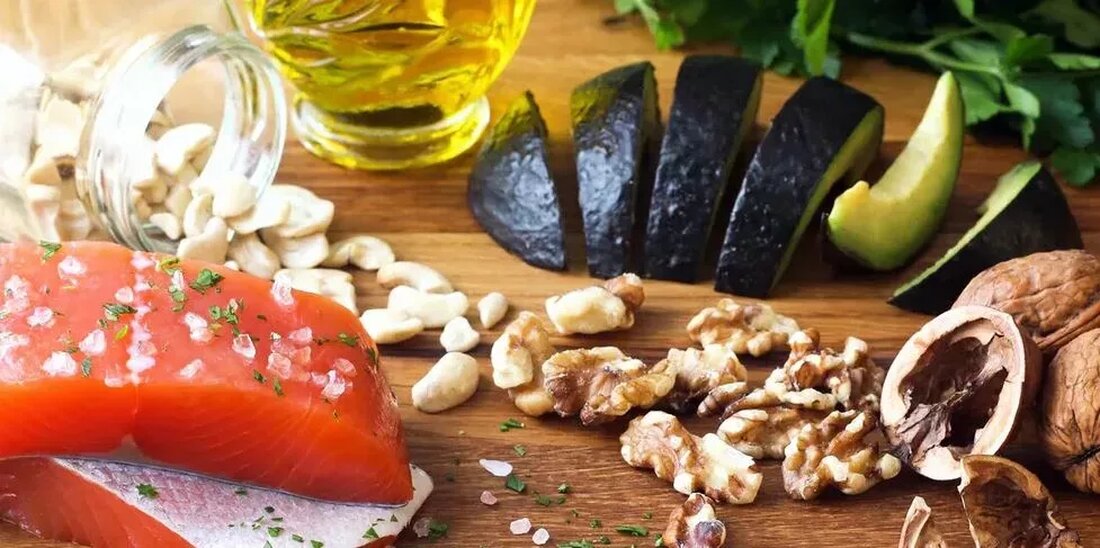Omega 3, 6, 9 fatty acids, EPA & DHA
You have probably heard the terms "fatty acid" and "Omega 3", but do you know what a fatty acid is or why your body needs it? What about the different types of fatty acids, in which foods can you find it naturally and how much does your body need to live a long, healthy life? Fatty acids are important so that all systems of the body function normally, including skin, respiratory tract, circulatory system, brain and organs. There are two fatty acids, so -called essential fatty acids (EFA), which your body does not produce itself. Efas must be taken. The two essential fatty acids, which the human body cannot produce, are the omega-3 fatty acid ...

Omega 3, 6, 9 fatty acids, EPA & DHA
You have probably heard the terms "fatty acid" and "Omega 3", but do you know what a fatty acid is or why your body needs it? What about the different types of fatty acids, in which foods can you find it naturally and how much does your body need to live a long, healthy life?
Fatty acids are important so that all systems of the body function normally, including skin, respiratory tract, circulatory system, brain and organs. There are two fatty acids, so -called essential fatty acids (EFA), which your body does not produce itself. Efas must be taken.
The two essential fatty acids that the human body cannot produce are the omega-3 fatty acid and the omega-6 fatty acid, which are important for the development of the brain, the function of the immune system and blood pressure regulation.
What is omega-3 fatty acid?
Omega-3 fatty acid (alpha-linolenic acid) is an essential fatty acid that plays an important role in brain function and may help you fight cardiovascular disease. The American Heart Association recommends a diet that includes fatty fish such as salmon, herring, sardines and tuna at least twice a week. ((link removed))
Although these foods are rich in omega-3 fatty acids, I personally do not agree to this recommendation, since fish can be contaminated and can be rich in mercury, which can have a negative impact on health. I also believe that a raw food from a little or no meat is better for the human body.
Health Benefits of Omega-3 Fatty Acid
Studies on the health advantages of omega-3 fatty acids have shown that it can be useful to treat the following:
- Asthma ((Link entfernt))
- Diabetes ((Link entfernt))
- Arthritis ((Link entfernt))
- Osteoporose ((Link entfernt))
- Einige Krebsarten ((Link entfernt))
- Hauterkrankungen (Quelle)
- Hoher Cholesterinspiegel ((Link entfernt))
- Hoher Blutdruck ((Link entfernt))
- Aufmerksamkeitsstörungen ((Link entfernt))
- Depressive Störungen ((Link entfernt))
- Makuladegeneration
- Verdauungsschwierigkeiten
Omega-3 fatty acids occur naturally in:
- Körner
- Spirulina
- Paranuss
- Hanföl
- Senfkörner
- Kürbiskerne
- Chia-Samenöl
- Weizenkeimöl
- Rapsöl (Raps)
- Grünblättrige Gemüse
- Rohe Walnüsse & Walnussöl
- Leinsamen oder Leinsamenöl
What is Omega-6 fatty acid?
Omega-6 fatty acid (linoleic acid) combined with omega-3 fatty acid provides many of the health benefits described above. However, the hardest part about playing the fatty acid game is that it's best to eat them in the right amounts.
You should eat about twice as much omega-6 as Omega-3 so that your ratio from Omega-6 to Omega-3 2: 1 is. In today's world of fast food, frozen starters and calorie-rich snacks, however, this is not unusual that most people actually get around 15 times more omega-6 than omega-3. The center for genetics, nutrition and health in Washington DC suggests that consumption of omega-6 and omega-3 in false shares can actually destroy the health benefits.
The best sources of omega-6 are seeds, nuts and grains, as well as green leafy vegetables such as lettuce, broccoli, purslane and kale, as well as certain raw vegetable oils. Care should be taken to use raw cold-pressed vegetable oils as cooking destroys the benefits of the fatty acids.
Omega-6 fatty acids of course also occur in:
- Olivenöl
- Wheatgerm
- Traubenkerne
- Pistazien
- Sesamöl
- Hanföl
- Kürbiskerne
- Chia-Samenöl
- Distelöl
- Sonnenblumenöl
- Baumwollsamenöl
- Rohe Nüsse & Samen
What is omega-9 fatty acid?
Omega-9 or monounsaturated oleic and stearic acid is a non-essential fatty acid that is produced naturally by the body when there are enough essential omega 3 and 6 fatty acids.
However, if you don't have enough Omega 3 and Omega 6, you need to get Omega 9 from your diet.
This fatty acid plays a role in promoting heart health by supporting healthy, balanced cholesterol levels and improving immune function.
Omega-9 fatty acids are also naturally found in:
- Avocados
- Pecannüsse
- Cashewkerne
- Mandeln
- Haselnüsse
- Pistazien
- Macadamianüsse
- Chia-Samenöl
- Oliven & Olivenöl
What is EPA and DHA?
In the body, omega-3 fatty acids are converted into DHA and EPA (docosahexaenoic acid and eicosapentaenoic acid, respectively). DHA and EPA are highly unsaturated fats that play a very important role in the development of vision and brain function in infants.
One study found significantly lower levels of EPA in the cells of patients who had attempted suicide, suggesting that omega-3 fatty acids may actually play a role in suicide prevention. DHA deficiency has been linked to Alzheimer's disease, attention deficit disorder, phenylketonuria, cystic fibrosis and other diseases. Blue-green algae are a good source of EPA and DHA.

 Suche
Suche
 Mein Konto
Mein Konto
